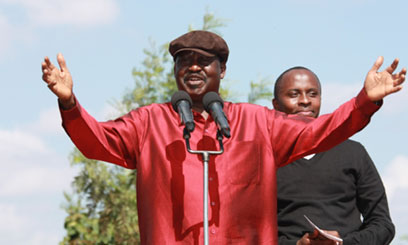NAIROBI, Kenya, Jan 19 – A new poll shows that Prime Minister Raila Odinga still remains the most popular presidential candidate ahead of competitors including Uhuru Kenyatta, Eldoret North MP William Ruto and Vice President Kalonzo Musyoka.
According to the poll conducted by Synovate in December 2011, Odinga would garner 32 percent ahead of Kenyatta at 22 percent, a drop by two points for each since the last opinion poll in October 2011.
Ruto and Kalonzo Musyoka come in third and fourth positions at 10 percent and 9 percent respectively.
According to Synovate Managing Director Maggie Ireri, the drop in the popularity of the top contenders is quite insignificant.
Ireri said: “The margin of error for this study lies within +/-2.2 percent so it is safe to say that there has not been any significant change in the support levels of these candidates.”
Ireri further said that a combination of Kenyatta and Ruto for the presidency was bound to attract more following from voters in the Rift Valley, Eastern and Central provinces, most of who do not approve of the ICC process.
“If Uhuru and Ruto unite to run for the presidency or if they don’t run and back one presidential candidate it is likely that people from their provinces will go along with their combination,” she explained.
According to Ireri there has been an increase in support for the ICC due to the manner in which the confirmation hearings were conducted in August and September last year.
The poll shows that 54 percent of Kenyans support the ICC with the majority of the support coming from Nyanza at 76 percent with Western and Nairobi provinces tied at 66 percent.
Twenty three percent of those polled however believe that the suspects facing the court are not the real culprits while 18 percent say they should have been tried by Kenyan courts.
In Central province where Kenyatta comes from, support is at 46 percent, while in the Rift Valley where the three other suspects (Ruto, Henry Kosgey and radio journalist Joshua arap Sang) have their base is 40 percent in favour of the process.
Another 35 percent are however against handling of the cases by the ICC whilst 11 percent of Kenyans did not have an opinion on the matter.
In October 2010 before the list of the Ocampo Six were known, support for the ICC was at 68 percent and this declined to 57 percent in December 2010.
In March 2011, support stood at 61 percent a period when the summons to appear at The Hague were issued. Between July and October 2011, support for the ICC process varied between 56 and 59 percent.
“Because the hearings were done in public and that the way in which the defence lawyers defended their clients sent out a clear message on how the ICC is handling the cases,” acknowledged Ireri.
Regardless of the outcome, Ireri is convinced that the varying support levels for the ICC in the regions point to potential regional political re-alignments.
The poll also found out that voters were ignorant of electoral laws, processes and the seats they will be required to vote for.
For instance, 72 percent of Kenyans are aware that they will only vote for MPs, other than voting for the President while the Constitution has provided for positions of Governors, Senators, Women’s Representative, County Assembly Representatives and the position of Councillors are retained from the former Constitution.
Further, only 14 percent of Kenyans are aware of the position of Women’s Representative with men being nearly twice more likely to be cognisant of this than women.
On the intention to vote in the forthcoming general elections, majority of Kenyans plan to vote with most provinces recording rates over 80 percent with only Coast province recording 78 percent. Central province recorded the highest intention to vote at 89 percent.










































